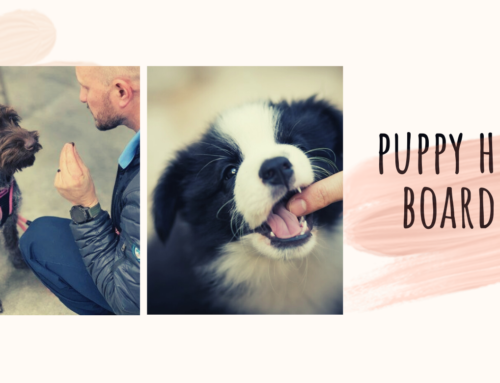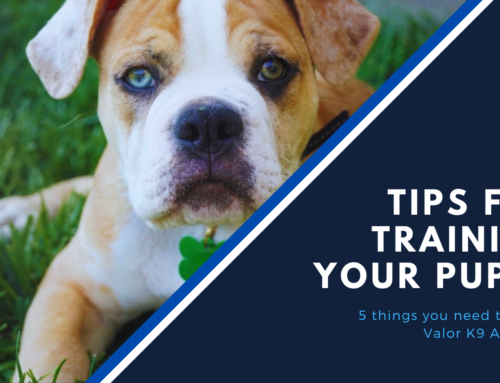Puppy Socialization is intentional and positive exposure to people, places, sights, sounds, surfaces and animals.
Bringing a new puppy into your home is a fun and exciting time for many families. These bouncing bundles of joy bring with them lots of laughs and love, but it is important that new puppy adopters understand the responsibility they have assumed.
Puppies require hard work and dedication to ensure that they grow up to be well-mannered and balanced members of society. Puppies undergo many changes physically and mentally during the first year of their life and it’s imperative that they have a strong leader to guide them along the way. It is our job to set them up for success by providing a solid training foundation through structure, confidence building, and socialization.
Socialization is intentionally exposing your puppy to new environments and situations. These experiences should be positive in order to build your puppy’s confidence. Early socialization equips puppies to live happily and safely within our society.
The critical socialization period occurs between 4 and 16 weeks of age but the socialization window extends to 9 to 12 months of age. During this time, puppies should be exposed to a wide variety of people, places, sights, surfaces, sounds, and animals. A one-hour per week puppy class is not adequate in fulfilling your puppy’s socialization needs. Puppy classes that are well-structured and taught by experienced professionals can be great for reinforcing manners and teaching appropriate social behavior; however, puppies need daily socialization to truly become acclimated and comfortable in our world.
An ounce of prevention is worth a pound of cure. Proper socialization will set your puppy up to be a confident and stable adult. Socialization can prevent a wide array of behavioral issues such as fearfulness, reactivity, anxiety, and aggression.
According to the American Veterinary Society of Animal Behavior, “Behavioral issues, not infectious diseases, are the number one cause of death in dogs under three years of age.” (akc.org) The benefits of socialization are endless. Socialized dogs experience: reduced stimulation and excitability, improved learning capability, enhanced cognitive flexibility, improved memory, reduced reactivity, as well as an increase in the amount of nerve endings in the brain.
Well-socialized puppies also have the privilege of growing into a go anywhere and do anything type of dog. There are many methods to use for socializing your puppy.
Dr. Ian Dunbar suggests having your puppy meet 100 people in 100 days. Puppy owners can use the 12 by 12 rule, where their puppy is to be exposed to 12 new people, dogs, sights, sounds, and surfaces by the time they are 12 weeks old. A good rule to follow is the Rule of 7s. Your puppy should be exposed to 7 new things each week.
These experiences should be positive and not forced upon your puppy. Allow your puppy to initiate contact with new people of varying gender, size, race, disability, and clothing. Encourage them to walk on new surfaces such as woodchips or tile floors. Expose them to new sounds like the hair dryer or vacuum. Puppies should also be exposed to animals of different species and sizes.
Refrain from letting your puppy greet dogs that you aren’t familiar with. It’s important to advocate for your puppy and not allow people or animals to approach them in a rushed manner. Your puppy also shouldn’t greet every person or thing he encounters in order to create neutrality. Socialized dogs should be calm and neutral, not overexcited and reactive.
As your puppy develops, it’s important to recognize and understand fear periods. Fear periods can cause puppies to become unsure or afraid of certain things, even if they have shown no aversion to them in the past. Puppies that have previously been confident and social may suddenly act skittish and shy.
Puppies may experience two fear periods. The first fear period occurs between 7 and 9 weeks of age and the second fear period typically occurs between 7 and 9 months of age. Fear periods occur when your puppy’s brain is going through a rewiring process called pruning. In this process, unused neural circuits are discarded while others are reconnected. During this time, your puppy’s brain is trying to sort out what is “safe” and “unsafe”. It’s important to avoid putting your puppy into scary situations during these periods. If you suspect your puppy is going through a fear period, it is best to limit exposure for a couple of weeks until you’re confident your puppy is out of the fear period. Puppies that have traumatic experiences during the fear impact period can have long lasting side effects.
There are three core factors that make up a dog’s behavior. Almost all behavioral problems can be traced back to inadequate socialization, training, and/or genetics. There is a mantra that states, “It’s all in how you raise them.” This argument is typically used to defend against breed stereotypes such as pit bulls being dog-aggressive. It would be ignorant to ignore the effect that breed and genetics play in the determination of a dog’s temperament.
While training and socialization are key factors in raising a stable dog, their genetic makeup will set the parameters of where a dog’s behavior can fall on a spectrum. Training and socialization will then dictate exactly where that dog is placed on the spectrum.
In order to successfully raise a puppy, we must be considerate of a dog’s genetic makeup. When getting a puppy from a breeder, potential adopters should do their due diligence in researching breeders and their lines. It’s important to talk with previous adopters about their dogs to get a solid idea of what their future puppy’s temperament might be. It is also important when researching breeds to find out what that breed was bred for, how naturally social they are, and what their energy level is like. Our dogs were bred for specific purposes and it’s our responsibility to respect their genetic makeup.
In conclusion, there are many factors at play when raising a puppy. By remembering the importance of genetics and establishing a solid socialization plan, you can set your puppy up for success. Lack of socialization can result in behavioral defects that last into adulthood. With safe socialization and an understanding of fear periods, puppies can be molded into confident and well-adjusted adults.
Valor K9 Academy offers private puppy lessons, puppy board & train programs, puppy classes and puppy boarding with add-on training. We are located in Boise, Chattanooga and Spokane, and we also offer a six week ZOOM puppy class that will set you and your puppy up for success. Ready to start training? Contact us today to schedule a free consultation. We’ve trained thousands of puppies since 2014, and we’d love to work with you!
Sources
“How to Raise the Perfect Dog: Through Puppyhood and Beyond” by Cesar Milan
“Social, Civil, and Savvy” by Laura VanArendonk Baugh
k9ofmine.com/how-to-socialize-puppy-checklist
akc.org/expert-advice/training/puppy-socialization








Leave A Comment